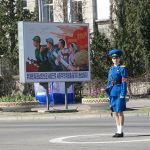I am not being frivolous. If you were to ask even German or Austrian nationals of below a certain age, say seventy, who Hans von Seeckt was, you might well get a blank expression. But it was Seeckt who prepared and made the German Army of which Hitler was so proud, and which he could use so effectively in France, Holland, Norway, Denmark, Poland etc. in the early years of the Second War.
Son of a general who was the son of a general, Hans was born in 1866. He served principally on the Eastern Front in the Great War, where he planned the break-through at Gorlice (q.v.). He was essentially a liker of monarchies, with the result that he found the Weimar Republic(q.v.) difficult to swallow. In his writings he describes the Republic as ‘wanting’. The Army, he stressed, represented the ‘national interest’. He wanted the Army to be ‘a state within a state’, owing first loyalty to the High Command, rather than any mere political leaders who, simply because they were elected did not impress him.
At the time of the Munich Beer-Hall Putsch (8-9 November, 1923), Seeckt was asked by President Friedrich Evert, first President of the Weimar Republic, if the Army would obey the government or the rebels (including their chief plotter, Adolf Hitler). The miltary aristocrat replied, “Herr Reich President, the Army will obey me.” He ordered the army commander to suppress the mostly drunken beerhallers. Hitler was imprisoned for 9 months, during which he wrote the first draft of Mein Kampf.
The Republic first knew how much they could put their trust in von Seeckt when the right-wingers attempted their ‘Kapp Putsch’ in 1920. He simply refused to use his soldiers to control the rioters. But when the Communists rallied in Saxony and the Ruhr, he was more than prepared to use force.
The Nazis hated him mostly because he had a clever Jewish wife, but they knew he was a winner because his paramount object was to restore German military power by avoiding and evading the limitations imposed upon Germany by the Treaty of Versailles (q.v.). Actually the German Army was forbidden by Versailles even to have a General Staff, but von Seeckt got over this by inventing a ‘Troop Bureau’, where senior officers continued to be trained (by Seeckt).
He managed to overlook Versailles’ limitations on the size of the Army by placing all emphasis on speed, mobility and short-term enlistment, which provided an enormous source of manpower. It was Seeckt who did deals with Krupp (q.v.) and other industrialists, who built factories outside Germany, ready for the inevitable war. His foresight was remarkable. Russia hardly knew that factories existed on their territory which produced aeroplanes and chemicals. There were tank-makers in neutral Sweden. Other weapons were being made in Holland, Denmark and even Switzerland. German pilots and tank crews were being trained in Russia.
After he had prepared the fighting forces to be ready for all-out war, Hans von Seeckt died, in 1936 at the comparatively young age of seventy. He has been virtually forgotten. The Second World War started only three years later.











Leave A Comment